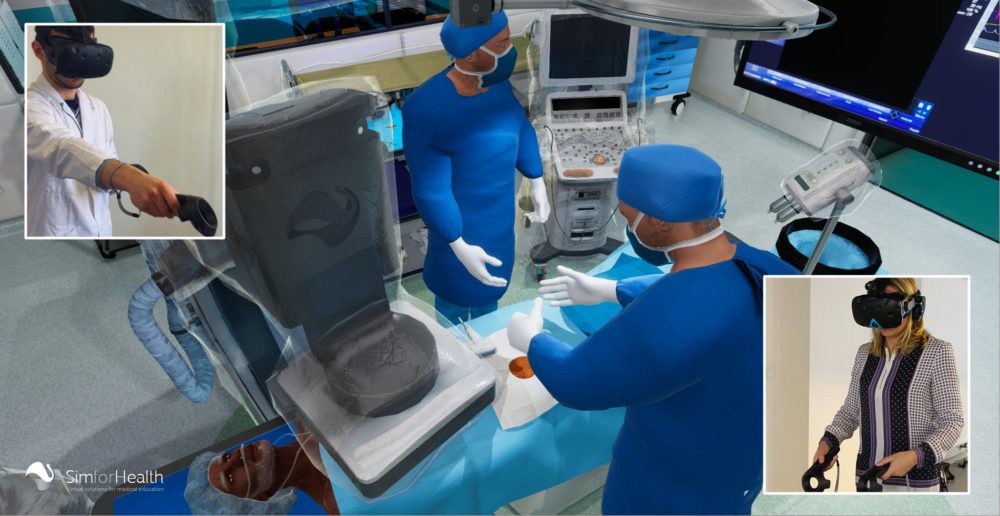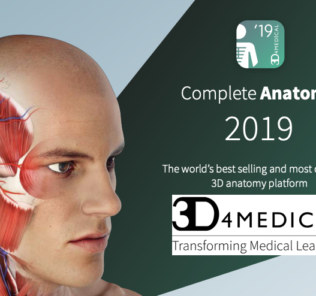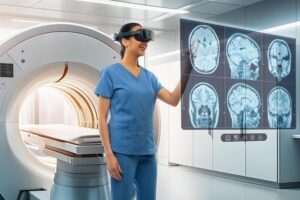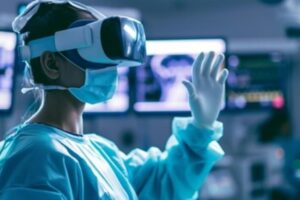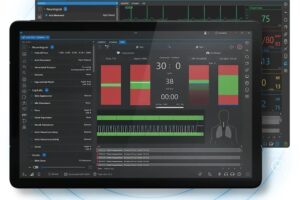SimforHealth Provides MedicActiV VR Training for Healthcare Professionals – Exclusive Video Interview
At SESAM Paris last year HealthySim had an opportunity to interview the award winning team from SimforHealth about their VR training product. MedicActiV aims to become a library of virtual clinical cases in all disciplines and medical and paramedical specialties in initial and continuing healthcare training. Build scenarios in VR, and then share and download more with the international library! Watch our in-person interview to learn more about this innovative award-winning platform! Are you attending CES next week in Las Vegas? SimforHealth will be prominently on display at the HTC Vive booth!
MedicActiV is compatible with the HTC Vive, Samsung Gear VR (Powered by Oculus), and the Microsoft Hololens. The MedicActiV platform was conceived and created by SimforHealth, creator of digital solutions for healthcare training. The SimforHealth teams bring together healthcare professionals, educational experts and 3D engineers. For over 5 years, they have been supporting training institutions, hospitals and public bodies in the creation of innovative tools for initial and continuing training.
Sponsored Content:
The MedicActiV platform aims to distribute medical knowledge to the largest number of people by encouraging a collaborative approach. Universities, university hospitals, simulation centers, academic societies, teaching organizations, can all create their clinical cases and distribute them to their learners or to their peers for teaching purposes. Whether in initial or continuing education, health professionals can in this way consult clinical cases on the MedicActiV platform and develop their knowledge and skills, thanks to learning by digital simulation.
With MedicActiV, any health professional, without any special I.T. knowledge, can create a clinical case in its entirety by entering the virtual patient’s medical record, the doctor/patient conversations and the different diagnostic and therapeutic decision options, as well as, at the end of the simulation, an assessment of the decisions taken. The resulting virtual clinical cases work thanks to an interaction between a “real” doctor and a “virtual” patient through a “chatterbot”.
Why Digital Simulation?
Digital simulation allows students to acquire their first skills and health professionals to keep their knowledge fresh by practicing virtually, so as to be optimally prepared to manage a patient. It is by being faced with a situation that one really learns how to deal with it. Digital simulation also enables the presentation of rare pathologies which a health professional may only see once in his or her career.
Sponsored Content:
The sharing of knowledge between peers through digital simulation techniques helps train everyone, hence avoiding the need to practice the first time with the patient. Digital simulation allows learning by trial and error without any consequences for the health of a real patient, and provides an immersive learning experience in which stimulation by a virtual patient and by questions helps memorization.
Practicing procedures, discussing therapeutic decision making, training virtually for complex situations – all are educational objectives to which digital simulation brings an innovative and relevant contribution, with the advantage of being adaptable to new forms of training: at a distance, alone, in a group etc.
Learn more on the SimforHealth website today!
Lance Baily, BA, EMT-B, is the Founder & CEO of HealthySimulation.com, which he started while serving as the Director of the Nevada System of Higher Education’s Clinical Simulation Center of Las Vegas back in 2010. Lance is also the Founder and acting Advisor to the Board of SimGHOSTS.org, the world’s only non-profit organization dedicated to supporting professionals operating healthcare simulation technologies. His co-edited Book: “Comprehensive Healthcare Simulation: Operations, Technology, and Innovative Practice” is cited as a key source for professional certification in the industry. Lance’s background also includes serving as a Simulation Technology Specialist for the LA Community College District, EMS fire fighting, Hollywood movie production, rescue diving, and global travel. He and his wife Abigail Baily, PhD live in Las Vegas, Nevada with their two amazing daughters.
Sponsored Content:



